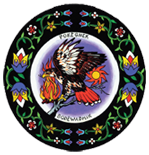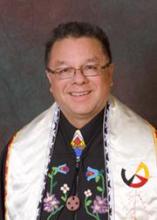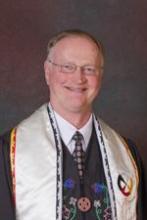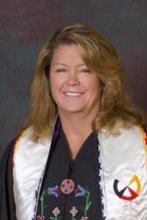Judicial Organization
The Judiciary is a separate, independent branch of the Pokagon Band government. The Tribal Court Judiciary consists of the Chief Judge, one Associate Judge, and three Appellate Court Justices. All members of the Judiciary are appointed by the Tribal Council to serve staggered four (4) year terms.
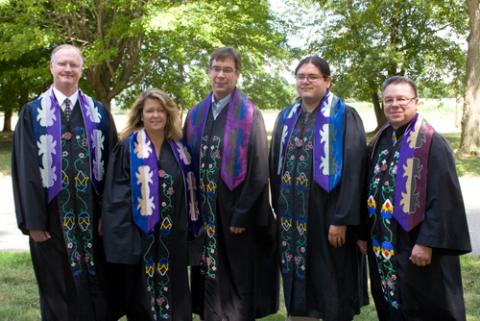
From left to right: Associate Judge David M. Peterson; Associate Justice Jill E. Tompkins; Former Chief Justice Robert T. Anderson; Chief Justice Matthew L.M. Fletcher; and Chief Judge Michael Petoskey.
Chief Judge Michael Petoskey (Pokagon Band of Potawatomi)
Michael Petoskey has been the Pokagon Band’s Chief Judge since his appointment in February 2002. He is a Grand Traverse Band of Ottawa & Chippewa Indians tribal member. Judge Petoskey has been a judge for various Michigan Indian tribes since 1986. He has served on the bench in each of the seven (7) federally-recognized Tribes in the Lower Peninsula of Michigan. Judge Petoskey began his judicial career with the planning, implementation and development of the courts for his own Tribe from just a dream, while he was a staff attorney for Michigan Indian Legal Services. He was the Chief Judge at the Grand Traverse Band for over sixteen (16) years until his retirement from the position. During the course of his career, Judge Petoskey has worked with four other Michigan Indian tribes to plan, implement and develop their courts, serving as the founding Chief Judge. He continues to serve two of those tribes in that capacity. Additionally, he has served as an appellate court judge for the remaining two Lower Peninsula of Michigan Indian tribes.
Chief Judge Petoskey is a 1983 graduate of the University of New Mexico School of Law and a Viet Nam veteran having served as an infantry medic.
In 1992 the Michigan Bar Journal recognized Judge Petoskey as a “Citizen Lawyer” for his contributions in law to Michigan tribal communities.
In 1997 he was named, along with eleven other attorneys, “Lawyer of the Year” Michigan Lawyers Weekly, a legal newspaper.
In 1999 the Grand Traverse Band Tribal Court was one of sixteen tribal programs nation-wide honored as an outstanding example of tribal governance by The Harvard Project on American Indian Economic Development, John F. Kennedy School of Government, Harvard University.
In 2000 the American Indian Law Section of the State Bar of Michigan honored Judge Petoskey and Michigan Supreme Court Justice Michael Cavanagh with the Section’s annual “Tecumseh Peacekeeping Award” for their leadership in moving State of Michigan courts and tribal courts away from conflict and toward cooperation.
In 2010 Judge Petoskey was featured as a “Master Lawyer” by the State Bar of Michigan to debut a new section of the State Bar.
In 2013 the National American Indian Court Judges Association presented Judge Petoskey its Lifetime Achievement Award in its inaugural year of making awards.
In 2014 Judge Petoskey was profiled in “Our Cause Will Ultimately Triumph –Profiles in American Indian Sovereignty”, a book edited by Tim Alan Garrison, for raising the stature of tribal courts and promoting tribal sovereignty by building strong relationships between Michigan’s state and tribal courts.
Also in 2014, Judge Petoskey and Michigan Supreme Court Justice Michael Cavanagh were each recognized by the Washtenaw County Bar Association for their collaborative work to first establish and then enhance the relationship between Michigan’s Tribal and State courts. Each was awarded the Association’s “Nelson Mandela Peacemaking Award”.
Judge Petoskey has served the Native American Rights Fund’s Indigenous Peacemaking Initiative Advisory Board since 2014.
Associate Judge David M. Peterson
David M. Peterson (P18834) is a graduate of Detroit College of Law. He is a member of the State Bar of Michigan and the Federal Bar. From 1985 to 1999, Judge Peterson served as a district judge of the Fifth District Court in Berrien County, Michigan. While on the bench, Judge Peterson was the presiding judge of the Criminal Division of the Berrien County Trial Court, chief judge of the District Court and was assigned as a circuit court judge under the Supreme Court Ordered Demonstration Project. Judge Peterson has served as a Neutral Election Official for the Little River Band of Ottawa Indians and as a Nottawasweppi Huron Band of the Potawatomi gaming commissioner before his appointment as the Associate Judge for the Nottawasweppi Huron Band in 2015. From 1970 to 1985, prior to becoming an elected judge, David Peterson worked in private practice in the areas of general criminal and civil litigation. Since retirement from the bench, Judge Peterson has resumed private practice on a limited basis primarily working in the areas of municipal law and governmental relations. He served as a Berrien County Commissioner from 1980 to 1985 and was chairman of the Board for two years. He has served many years on the Michigan Attorney Discipline Board.
Chief Justice Matthew L.M. Fletcher (Grand Traverse Band)
Matthew L.M. Fletcher is the Harry Burns Hutchins Collegiate Professor of Law at University of Michigan Law School. He teaches and writes in the areas of federal Indian law, American Indian tribal law, Anishinaabe legal and political philosophy, constitutional law, federal courts, and legal ethics.
Professor Fletcher also sits as the Chief Justice of the Poarch Band of Creek Indians, an appellate judge for the Cabazon Band of Mission Indians, the Colorado River Indian Tribes, the Grand Traverse Band of Ottawa and Chippewa Indians, the Hoopa Valley Tribe, the Lower Elwha Klallam Tribe, the Mashpee Wampanoag Tribe, the Match-E-Be-Nash-She-Wish Band of Pottawatomi Indians, the Nottawaseppi Huron Band of Potawatomi Indians, the Rincon Band of Luiseño Indians, the Santee Sioux Tribe of Nebraska, and the Tulalip Tribes. He is a member of the Grand Traverse Band.
He previously taught at the Michigan State University College of Law (2006 to 2022) and the University of North Dakota School of Law (2004 to 2006). He has been a visiting professor at the law schools at the University of Arizona; the University of California, Hastings; the University of Michigan; the University of Montana; and Stanford University. He is a frequent instructor at the Pre-Law Summer Institute for American Indian students.
He was lead reporter for the American Law Institute’s Restatement of the Law of American Indians, completed in 2022. He has published articles in the California Law Review, Michigan Law Review, Northwestern University Law Review, and many others. His hornbook, Federal Indian Law (West Academic Publishing), was published in 2016 and his concise hornbook, Principles of Federal Indian Law (West Academic Publishing), in 2017. Professor Fletcher co-authored the sixth and seventh editions of Cases and Materials on Federal Indian Law (West Publishing, 2011 and 2017) and both editions of American Indian Tribal Law (Aspen, 2011 and 2020), the only casebook for law students on tribal law. He also authored Ghost Road: Anishinaabe Responses to Indian-Hating (Fulcrum Publishing, 2020); The Return of the Eagle: The Legal History of the Grand Traverse Band of Ottawa and Chippewa Indians (Michigan State University Press, 2012); and American Indian Education: Counternarratives in Racism, Struggle, and the Law (Routledge, 2008). He co-edited The Indian Civil Rights Act at Forty with Kristen A. Carpenter and Angela R. Riley (UCLA American Indian Studies Press, 2012) and Facing the Future: The Indian Child Welfare Act at 30 with Wenona T. Singel and Kathryn E. Fort (Michigan State University Press, 2009). Professor Fletcher’s scholarship and advocacy has been cited several times by the United States Supreme Court. Finally, Professor Fletcher is the primary editor and author of the leading law blog on American Indian law and policy, Turtle Talk, http://turtletalk.wordpress.com/.
Professor Fletcher worked as a staff attorney for four Indian Tribes: the Pascua Yaqui Tribe, the Hoopa Valley Tribe, the Suquamish Tribe, and the Grand Traverse Band. He previously sat on the judiciaries of the Lac du Flambeau Band of Lake Superior Chippewa Indians, the Little River Band of Ottawa Indians, and the Turtle Mountain Band of Chippewa Indians; he also served as a consultant to the Seneca Nation of Indians Court of Appeals.
He is married to Wenona Singel, a member of the Little Traverse Bay Bands of Odawa Indians, and they have two sons, Owen and Emmett.
Associate Justice Jill E. Tompkins (Penobscot)
Jill E. Tompkins, a Penobscot Nation of Maine citizen, was appointed as an Associate Justice for the Pokagon Band Court of Appeals on February 14, 2002. Since October 2023, she has served as the Executive Director of the Maine Indian Tribal-State Commission (MITSC). MITSC is an intergovernmental entity responsible for continually reviewing the effectiveness of the Maine Indian Claims Settlement Act of 1980 and the social, economic, and legal relationship between the Houlton Band of Maliseet Indians, the Passamaquoddy Tribe, the Penobscot Nation, and the State of Maine. She graduated from The King’s College with a B.A. in English and History and was the first Native American to graduate from the University of Maine School of Law. She was also the first Native American woman admitted to law practice in Maine, and she has been licensed to practice in the courts of the Penobscot Nation and Passamaquoddy Tribe, as well as the United States Supreme Court and numerous other tribal, federal, and state courts. She has served as a trial and appellate judge in several tribal courts.
Before coming to MITSC, Ms. Tompkins worked as the Court Attorney for the Nonremovable Mille Lacs Band of Ojibwe Court of Central Jurisdiction, where she led the establishment of the Band’s Family Healing to Wellness Court, which works with families to help them recover from the effects of substance use disorder.
Ms. Tompkins taught at the National Judicial College and organized the annual National Tribal Judicial Conference sponsored by the National American Indian Court Judges Association. She was the first woman to serve as the Association’s Board of Directors President. As the founding Executive Director for the National Tribal Justice Resource Center in Boulder, Colorado, Ms. Tompkins provided training and technical assistance for tribal courts throughout Indian Country.
For eleven years as a Clinical Professor of Law at the University of Colorado Law School, Ms. Tompkins taught student attorneys participating in the American Indian Law Clinic. She established Colorado Law’s American Indian Law Certificate Program. She has been a frequent lecturer and writer on tribal justice systems, the application of the federal Indian Child Welfare Act, and the Maine Indian Land Claim Settlement Act.
Jill resides on Indian Island, Penobscot Nation Reservation, and is the mother of two sons and one daughter. She was a founding Board member of the Maine Indian Basketmakers Alliance.
Associate Justice Angela R. Riley (Citizen Potawatomi Nation)
Angela R. Riley (Citizen Potawatomi Nation) is Professor of Law at UCLA School of Law and Director of UCLA's Native Nations Law and Policy Center. She directs the J.D./M.A. joint degree program in Law and American Indian Studies and serves on the UCLA campus Repatriation Committee. Professor Riley's research focuses on Indigenous peoples’ rights, with a particular emphasis on cultural property and Native governance. Her work has been published in the Yale Law Journal, Stanford Law Review, Columbia Law Review, California Law Review, Georgetown Law Journal and numerous others. She received her undergraduate degree at the University of Oklahoma and her law degree from Harvard Law School.
Professor Riley began her career clerking for Chief Judge T. Kern of the Northern District of Oklahoma. She then worked as a litigator at Quinn Emanuel in Los Angeles, specializing in intellectual property litigation. In 2003 she was selected to serve on her tribe’s Supreme Court, becoming the first woman and youngest Justice of the Supreme Court of the Citizen Potawatomi Nation of Oklahoma. In 2010 and again in 2016 she was elected by her tribe's General Council to serve as Chief Justice. She previously served as Co-Chair for the United Nations - Indigenous Peoples’ Partnership Policy Board, with a dedicated mission to implement the UN Declaration on the Rights of Indigenous Peoples. She has also served in a judicial capacity for the Morongo Band of Mission Indians and for the Rincon Band of Luiseño Indians.
Professor Riley is a member of the American Law Institute and a co-editor of the Cohen's Handbook on Federal Indian Law. She served as the Oneida Indian Nation Visiting Professor of Law at Harvard Law School in Fall 2015.
